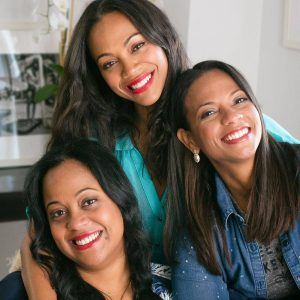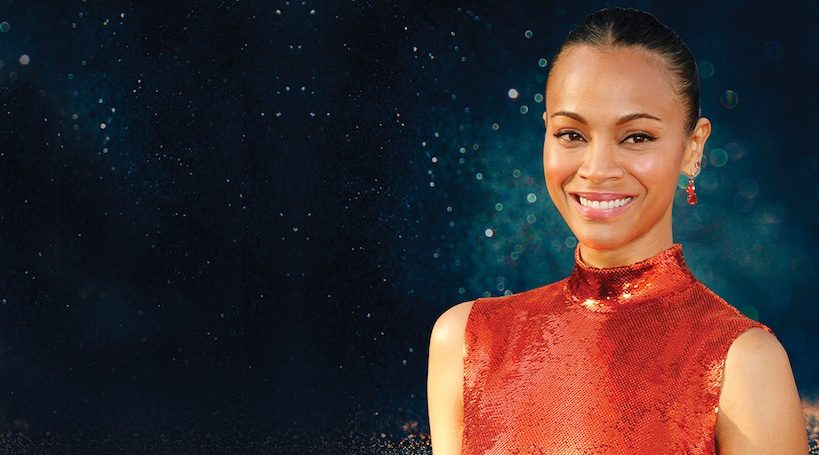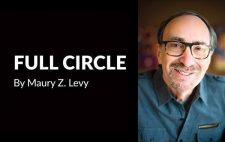 Zoe Saldana admits she can get a little preachy – she’s even called herself “a very rigid, very type-A kind of person. I’m always thinking, ‘I should have done this, I should have done that.’ I’m very critical.”
Zoe Saldana admits she can get a little preachy – she’s even called herself “a very rigid, very type-A kind of person. I’m always thinking, ‘I should have done this, I should have done that.’ I’m very critical.”
But maybe preachy isn’t the right word.
When Saldana is asked to speak about her own experiences with motherhood, sexism, racism and misogyny or to weigh in on how she sees those issues playing out in the world around her, she’s quick to offer an opinion. There’s none of the empty talk most Hollywood publicists hope their clients will practice.
Instead, there’s Zoe, just telling it like it is.
“I come from a family of women – tough women. Not in a bad way, just resilient and strong, and determined and super-opinionated,” she says. “I have a strong sense of self. I have no problem admitting my errors; just have respect for me.”
At 39, Saldana’s career becomes more high-profile with every box-office hit she banks. She’s built her brand of fame by playing strong, complex, powerful women; most of the time, in space.
Born in New Jersey and raised between Queens, New York and the Dominican Republic, Saldana spent the ’90s and the early 2000s dancing ballet, performing with a theater group in Brooklyn and taking smallish roles in TV dramas and movies. (Who could forget her iconic turn in the 2002 Britney Spears flick “Crossroads?”)
Then, suddenly, it was life on a rocket ship, and 2009 was a very, very good year to be Zoe Saldana. She played Nyota Uhura in director J.J. Abrams’ reboot of “Star Trek” and the alien Neytiri in James Cameron’s “Avatar.” The latter grossed $2.7 billion worldwide, becoming the highest grossing film of all time.
Star Trek sequels followed in 2013 and 2016, and in 2014 she played yet another ass-kicking alien: “Guardians of the Galaxy’s” Gamora. That film’s sequel hit theaters in 2017, with a box-office profit even bigger than the first installation’s.
Saldana is currently filming Avatar sequels – yes, plural – as Avatar 2, 3, 4 and 5 are filming concurrently. And at the end of last month, she appeared in “Avengers: Infinity War,” cementing her place in the Marvel film universe.
Saldana caused a media ruckus in early April during The Avengers press tour, when she (shocker) didn’t hesitate to speak her mind in an interview.
Saldana was asked why she didn’t have more name recognition despite appearing in the biggest blockbusters of the last decade, plus a laundry list of indies to boot. Saldana didn’t mince words. Reason No. 1? People are snobby.
“I’ve been in rooms with people in this industry who are great at what they do, but they’re absolutely elitist, and they look down at movies like the Marvel films or actors like myself,” she said. “They think we’re selling out in some way.”
“Every time they speak, I feel so disappointed in them, because whenever you see pictures of people in this industry who donate their time to children in need, it’s these actors who live in the world that you feel is selling out. It’s these actors that understand the role they play inspires a 5-year-old who has one dying wish to meet a superhero. That actor takes time out of their life and sits down with that 5-year-old and says, ‘I see you, I hear you, and you matter.’”
“Those elitists should be a little more cognizant about what playing a superhero means to a young child,” Saldana added. “Because you’re not just dissing me, you’re dissing what that child considers important in their world.”
 Saldana takes every role extremely seriously. She’s said that the inspiration for Gamora – a character in a film that has far more comedic moments than heavy ones – came from a documentary she saw about the Lost Boys of Sudan. She puts all her energy into her craft, and she respects the women she brings to life on screen.
Saldana takes every role extremely seriously. She’s said that the inspiration for Gamora – a character in a film that has far more comedic moments than heavy ones – came from a documentary she saw about the Lost Boys of Sudan. She puts all her energy into her craft, and she respects the women she brings to life on screen.
“I feel so proud to be living in space, to be playing green and blue aliens, to inspire, primarily, the younger generations,” she continued. “I remember what it was like to be young and to feel completely excluded out of the mainstream conversation of life because I was just little and unimportant and ‘other.’”
The idea of being “other” is something that comes up a lot, especially at a time when the conversation in Hollywood is shifting toward representation for women, and especially for women of color.
Saldana’s an activist in this arena – she recently founded her own media company, BESE, to tell the underreported stories of Latinos, and she and her sisters run Cinestar Pictures, a production company devoted to women’s stories. But while Saldana’s a crusader for representation – and one who continually puts her money where her mouth is – she thinks talk can be cheap.
“You have my black people and then you have my Latino people, and all that they’re doing is trying to figure out what I am as opposed to just appreciating the fact I’m working as a woman in America. I am breaking down as many barriers as I possibly can without having to complain about it or lose people’s attention,” she says.
“I’m like, let’s just focus on the progress. Focus on your education and your uprising, and when you’re in that position – when you’re the president of that network, when you’re the president of that newspaper, you can lead by example.”
It’s not that Saldana doesn’t second-guess herself. She talks a lot about anxiety and insecurity, particularly on the YouTube show she hosts with her sisters Mariel and Cicely, “Rosé Roundtable.” In each episode, the trio is joined by a handful of other women, and the group discussion revolves around themes of womanhood. There’s also a lot of rosé.
“We feel free after speaking up,” Saldana says. “[I think] if I do say how I feel, will I never be hired? Or will there be millions of trolls out there saying horrible things? The reality is yes, that will happen. But if we just focus on the voices that are changed or assisted from us setting an example, that is super powerful. That kind of good outweighs the bad that may come to you personally or professionally. What’s the greater good I’ll get from speaking up? I’ll get freedom.”
Saldana is insanely busy. She’s always working in front of the camera or behind the scenes as a producer (Cinestar’s first feature-length film, “The Honor List,” will be released digitally on May 11), plus she’s building a media empire and raising three sons under the age of 6.
But she’s the last person to tell you a woman can “do it all.” In fact, she really doesn’t think you should.
“As women, we have to learn to feel extremely comfortable with the word no,” she says. “Because the moment you wake up as a woman – I’m not trying to be a pessimist – but you’re going to deal with so many more obstacles than a man will deal with in a day. So if you’re not comfortable with the word no, you’re going to become a very unhappy individual.”
“It took me years in my profession to learn how to say no, based on principle. It is ok for you, as a woman, to say no when it best serves your purpose at that time. It doesn’t matter if you’re being selfish. It is ok for you to say no. It is ok to be self-focused. It is ok to put yourself first.”














